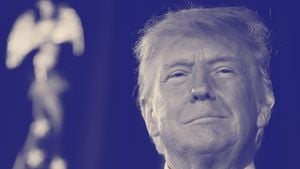The recent rise of the U.S. dollar has created ripples across the globe, stirring both excitement and concern within economic circles. Following Donald Trump’s election victory, traders and analysts have observed significant gains for the dollar, prompting questions about the larger global economic consequences of this trend.
"The dollar rose the most it had in years against several major currencies," noted Joe Rennison, writing for the New York Times. The day after the election, the greenback soared, continuing this upward momentum and reaching fresh yearly highs. This value surge is especially pronounced when compared to the dollar's performance earlier this year.
Economists and market forecasters are increasingly concerned about how these fluctuations may impact both the U.S. economy and the global market. The dollar enjoys its status as the world’s dominant currency, utilized for nearly 90 percent of foreign exchange transactions and commonplace for pricing significant commodities like oil. This positioning means changes to the dollar could have widespread effects.
On one hand, the strengthening dollar can be advantageous for Americans, making foreign goods and international travel less expensive. Yet, the scenario flips for U.S. exporters, who may find themselves at a disadvantage as their products become pricier for buyers overseas. This situation could result in lower sales abroad, potentially harming U.S. jobs and economic prospects.
What sparks much of this conversation is the interplay of Trump’s administration policies and how they are expected to affect currency value. Trump has often expressed his preference for a weaker dollar, believing it would bolster U.S. exports. But experts argue his proposed tariffs on imports and tax cuts may paradoxically result in dollar strength. The anticipated tariffs could make imports more expensive, thereby bolstering domestic industries.
Following the election results, many forecasters adjusted their outlooks. According to analysts at JPMorgan, the dollar index could increase by another 7 percent within months, especially if the euro and the Chinese renminbi continue to weaken against the dollar. Analysts from Barclays have even suggested the possibility of parity between the dollar and the euro, should Trump's pledges materialize, including hefty tariffs on imports.
While the surge provides short-term purchasing power for Americans, there are warnings about potential inflation, which could negate these benefits. Inflationary pressure, coupled with rising interest rates, could complicate the financial narrative. With the Federal Reserve likely reacting to inflation by raising rates, the demand for dollars could shift once again, and higher rates may invite foreign investment, strengthening the dollar even more.
Analysts from Société Générale don’t expect substantial increases long-term, predicting the dollar might stabilize or even edge lower as geopolitical tensions and trade relationships evolve. If tariffs ignite retaliatory measures from countries like China and Japan, the dollar's growth could face new challenges.
Considerations move beyond mere economics; geopolitical landscapes could shift substantially. Wars and global insecurity may cause other nations to interfere to protect their currencies against the rising dollar. This leads to questions about the durability of dollar strength amid crisscrossing international relationships.
For now, the world watches as the dollar commands the global economic stage. The stakes are high, with politics, export dynamics, and foreign relations intricately tied to this one nation's currency health. What happens next could shape international economics for years to come. The dollar will continue to evolve, riding highs and lows according to U.S. policies and the response of global partners.
The Canadian dollar, known as the loonie, recently hit a four-year low, inching dangerously close to the 71 cents U.S. threshold, much to the concern of Canadian analysts. Sarah Ying, head of foreign exchange strategy at CIBC Capital Markets, referenced the importance of monitoring this level, as it echoes sentiment from the pandemic’s economic shifts. Analysts attributed this drop largely to rate policy divergence between the U.S. and Canada, with the former poised for possible increases and the latter still grappling with slower economic growth.
All these factors contribute to the complex web of global finance and exchange rate dynamics. For those keeping their eyes on the shifting dollar, the reality sits at the intersection of economic policy, geopolitical tensions, and trade relationships, each element playing its role as the world moves forward. The future remains finely balanced between opportunity and caution.



